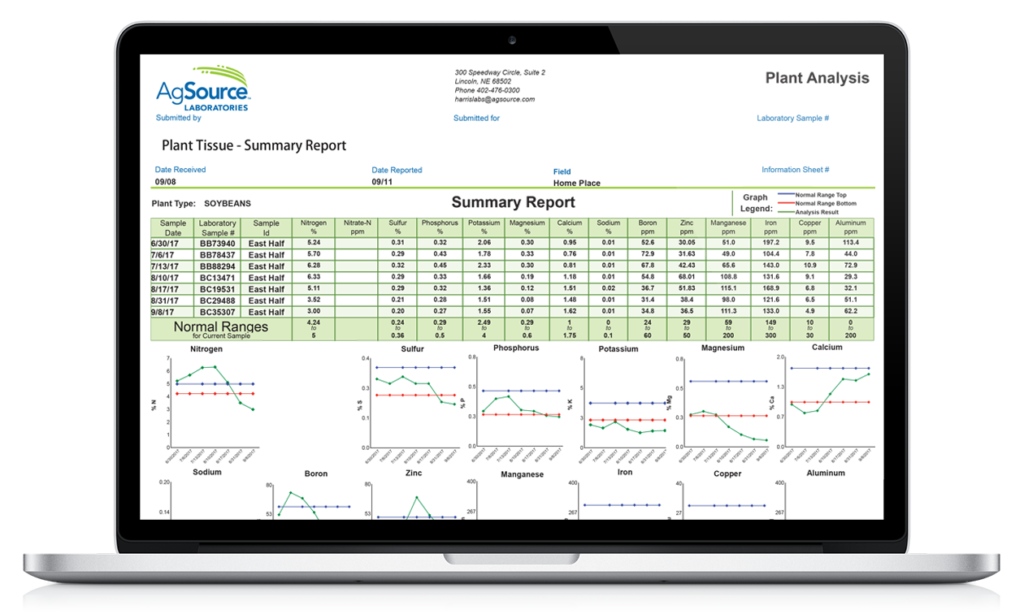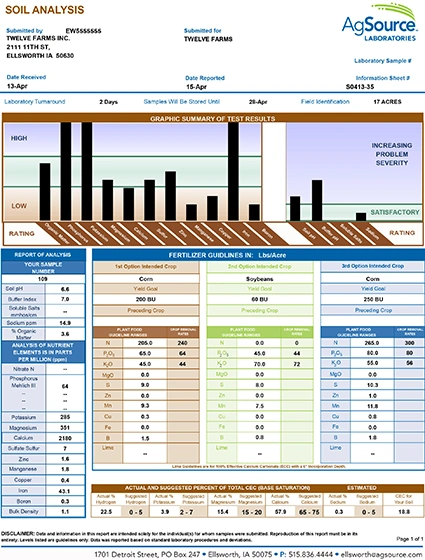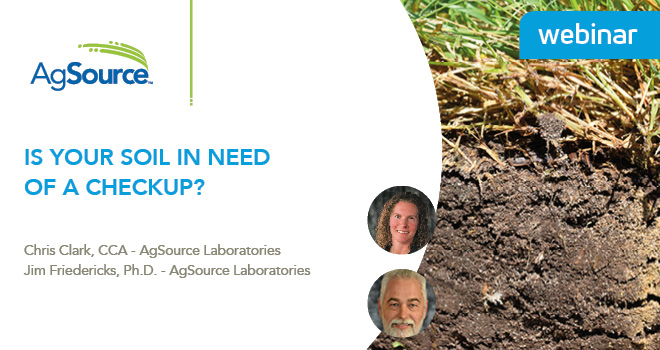Don’t guess with soil fertility. Set your growing program up for success with a soil test.
Laboratory soil testing is a fundamental aspect in developing and implementing any soil fertility program. A soil test, which can range from a composite sample representing 80 acres, to intensive grid samples representing one acre, provides the clarity needed to accurately maximize yield with the proper amount of inputs.
Reach out to one of our soil experts for more information on our test packages and services.
Responsible Stewardship
Know your soil nutrients to make responsible fertility decisions (right source, right rate, right time, right place)
Cost Savings
Don’t spend money on inputs where you don’t have to! Uncover the true nutrient status of soil with an analysis
Automated Data Processing
API transfer allows clients to view data their way
Certified
AgSource Laboratories follows strict and rigorous testing standards
- Testing options
- Reporting Options
- How to take a Sample
- Resources
Explore packages offered by lab location
Soil Testing Packages
Basic: Potassium, Phosphorus, pH, Buffer pH, Organic Matter
Basic Plus: Basic Package + CEC
Basic Select: Basic Plus Package + Zinc, Sulfur
Complete: Basic Select + Copper, Iron, Manganese, Boron
Cyst Nematode Only: Soybean Cyst Nematode (no fertility)
Nitrate (NO3) Only: Nitrate (no fertility). Ammonium (NH4) can be added
Additional Tests
• Bray Phosphorus (Bray P1)
• Bray 2 Phosphorus (Bray P2)
• Olsen Phosphorus (Olsen P)
• Soluble Salts
• Wet K (Moist Soil Extracted K)
• Late Spring/Pre-Sidedress Nitrate
• Soybean Cyst Nematode
*Additional tests may be available upon request
Soil Testing Packages
Basic: Soil pH, Buffer Index, Soluble Salt, Excess Carbonate, Organic Matter, Sodium, Phosphorus, Potassium, Magnesium, Calcium, CEC, Percent Base Saturation, Fertilizer Recommendations
Routine: Basic Package + Nitrate, Sulfur, Zinc
Diagnostic: Routine Package + Manganese, Copper, Iron, Boron
Additional Tests
• Nitrate
• Traces
• Salinity
• Soluble Nutrients
• PSA
• Late Spring/Pre-Sidedress Nitrate
*Additional tests may be available upon request
Soil Testing Packages
Basic: pH, Buffer pH, Potassium, Phosphorus, Organic Matter
Routine: Basic Package + Calcium, Magnesium, CEC, Percent Base Saturation
Complete: Routine Package + Boron, Zinc, Sulfur, Manganese
Complete Plus: Complete Package + Copper, Iron, Lime and Fertilizer Recommendation
Additional Tests
• Ammonium Acetate
• Mehlich 3 P
• Olsen P
• Bray 2 P (strong bray)
• Chloride
• Molybdenum
• Soil Texture
• Total Kjeldahl Nitrogen
• Ammonium
• % Carbon
• Nematode (Soybean or Corn)
• Bulk Density
• Late Spring/Pre-Sidedress Nitrate
*Additional tests may be available upon request
Turnaround time for soil analysis is two working days.
AgSource can provide a variety of reporting options customized to your specific needs, including transfer of data via API.
Popular options include:
Results are available in a variety of formats including Excel, PDF, CSV or XML files online, via email or standard mail as well as API/web service.
A good sample is the key to an accurate analysis. Consistency is the important to obtaining the most accurate soil test results for a soil fertility program. Follow our basic sampling reminders for best results.
AgSource Laboratories Soil Sampling Reminders:
- Most surface samples are taken from a depth of 0 – 6” up to 8” as this is where management of fertilizers and soil amendments occur. For mobile nutrients (nitrate, sulfate and chloride) an additional profile (6-36” up to 38”) should be collected in a separate bag with the sample depth labeled.
- A composite sample allows for a representative analysis. At least 15-20 cores are needed for conventional sampling, and a minimum of 10 cores are necessary for GRID soil sampling.
- Fill soil bag completely. The laboratory needs at least 8-16 oz. of material to perform all analyses.
- Consistency is key – the time of year you test (early fall vs. spring) can affect analytical results. Whatever time of year you decide to sample, it is best to stick to it annually.
- Soil is biologically active! It is important to collect a sample and ship no later than the next day. If storage is required three options are available: dry the soil with low heat (no greater than 120°F), store in a freezer, or refrigerate. This will slow down biological activity, preserving sample integrity periods.
Soil Testing Companion Analysis
Plant Tissue Testing
Looking to fine-tune your fertilizer program throughout the growing season? We recommend using our summary plant tissue report which allows you to track and view past sample results of your crop






